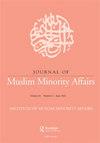“同一把刷子”:澳大利亚穆斯林寻求庇护者的种族主义和反种族主义建构
IF 0.4
0 RELIGION
引用次数: 1
摘要
尽管澳大利亚长期以来享有多元文化国家的声誉,但围绕移民的政治、媒体和公共话语中,尤其是穆斯林和寻求庇护者的讨论中,仇外和融合主义思想仍然根深蒂固。现有文献表明,在反对在澳大利亚重新安置难民的争论中,伊斯兰教通常被构建为与澳大利亚社会不相容。然而,一些研究强调了对这些观点的抵制,但很少有研究探讨这些抵制的叙述是如何构建的。本文提出了对24名西澳大利亚人的半结构化访谈的批判性话语分析,他们讨论了他们对寻求庇护者的看法。支持限制性庇护政策的与会者再现了对穆斯林的融合主义态度,而表示欢迎庇护观点的与会者则经常挑战这些观点。我讨论了澳大利亚政治庇护辩论中这些对立观点的话语和修辞特征,概述了民主和政治交流的一些重要含义,以及批判性种族分析和社会学学术。本文章由计算机程序翻译,如有差异,请以英文原文为准。
“Tarred with the Same Brush”: Racist and Anti-racist Constructions of Muslim Asylum Seekers in Australia
Abstract Despite Australia's longstanding reputation as a multicultural nation, xenophobic and integrationist ideas remain embedded within political, media and public discourse surrounding migration, especially within discussions of Muslims and asylum seekers. Existing literature indicates that within arguments that oppose refugee resettlement in Australia, Islam is routinely constructed as incompatible with Australian society. Some research, however, has highlighted resistance to these ideas, yet few studies have explored how these narratives of resistance are constructed. This paper, presents a Critical Discourse Analysis of semi-structured interviews with 24 Western Australians who discussed their perspectives concerning asylum seekers. Participants who supported restrictive asylum policies reproduced integrationist attitudes toward Muslims, however those who expressed welcoming asylum views routinely challenged these ideas. I discuss the discursive and rhetorical features of these opposing takes on Australia's asylum debate, outlining some important implications for democracy and political communication, as well as for critical race analysis and sociological scholarship.
求助全文
通过发布文献求助,成功后即可免费获取论文全文。
去求助
来源期刊

Journal of Muslim Minority Affairs
RELIGION-
CiteScore
1.40
自引率
0.00%
发文量
31
期刊介绍:
Journal of Muslim Minority Affairs is a peer reviewed research journal produced by the Institute of Muslim Minority Affairs (IMMA) as part of its publication programme. Published since 1979, the journalhas firmly established itself as a highly respected and widely acclaimed academic and scholarly publication providing accurate, reliable and objective information. Journal of Muslim Minority Affairs provides a forum for frank but responsible discussion of issues relating to the life of Muslims in non-Muslim societies. The journalhas become increasingly influential as the subject of Muslim minorities has acquired added significance. About 500 million Muslims, fully one third of the world Muslim population of 1.5 billion, live as minorities in 149 countries around the globe. Even as minorities they form significant communities within their countries of residence. What kind of life do they live? What are their social, political and economic problems? How do they perceive their strengths and weakness? What above all, is their future in Islam and in the communities of their residence? The journal explores these and similar questions from the Muslim and international point of view in a serious and responsible manner.
 求助内容:
求助内容: 应助结果提醒方式:
应助结果提醒方式:


